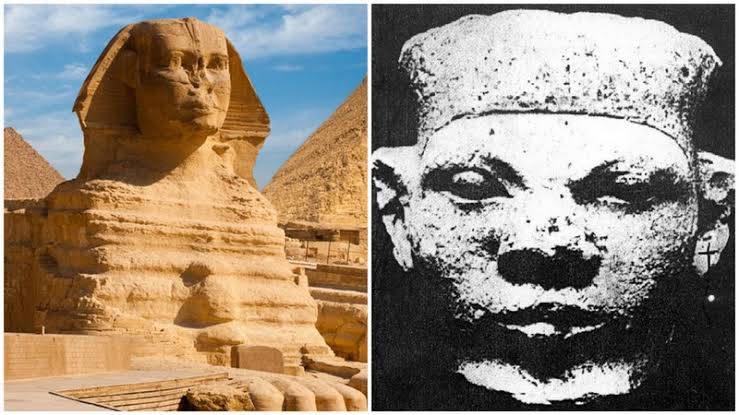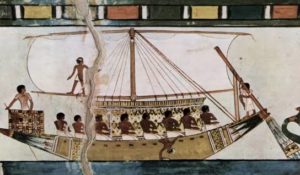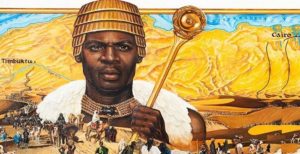
Most people in the world who have had an age of grandeur or golden age, have had only one. As did the Romans, the Greeks rose and fell and never rose again. The Africans have had the golden age on the eastern side of the continent for about two thousand years, then bounced back from defeat and decline, and had another golden age on the western coast of Africa from 11th to 15th Centuries, when Europe was still fast asleep.
Normally, people assume that when Europe was having its Middle Ages, everyone else was having theirs. But the fact is that there were people in the world who had no Middle Age, no age of backwardness, and these people were in Africa, Inner West Africa, Western Sudan. Three great, magnificent states, Ghana, Mali, Songhai unfolded while Europe was having its period of depression. In 1415, the Portugese attacked a part of Morocco , a little place called Cueta, and for the first time a European had taken over some African territory.
The Republic of Ghana is named after the medieval West African Ghana Empire, which became known in Europe and Arabia as the Ghana Empire after the title of its emperor Ghana. With its present borders, Ghana has existed only for approximately one hundred years.
According to the Greek historian Herodotus, the Egyptian Pharaoh sent sailors along the African coastlines about the year 600 BC. These Phoenician sailors probably also landed on the Guinea coast . The early Kingdom of Ghana (sometimes known as Ghanata or Wagadugu) was one of the most powerful African empires for several hundred years.

At that time, it was far more developed than any European country. It included most of present day Senegal, and some parts of Mali and Mauritania, but did not reach as far south as Ghana today.
Ghana was historically called Gold Coast, best known for its beautiful, long shore which once served as a major trading hub. The earliest history of Ghana can be traced back to 1500 BC with the arrival of the Dagombas people along with the Akans, the Gas and the Ewes.
By the middle of the 15th century, the Portugese began trading with the people along the west coast of Africa to which they gave the name Guinea after the Sudanic Empire of Ghana. At first they traded mainly in gold, but before long they began to take slaves as well. Cristobal Colon , later known as Christopher Columbus , said in his diary:
”As man and boy, I sailed up and down the Guinea coast for 23 years".
Ghana reached the height of its greatness during the reign of Tenkamenin, one of the great kings, who came to power in AD 1062. The Empire was well organized. The political progress and social well- being of its people could be favorably compared to the best kingdoms and empires that prevailed in Europe at that time.
The country had a military force of 200,000 men.
In 1076 AD, Ghana was occupied by the Almoravids under the leadership of Abu Bakr of the Sosso Empire but it regained its independence just after eleven years in AD 1087. The famous Arab writer, El Idrisi, after about a hundred years, wrote of Ghana being "the greatest kingdom of the Blacks". In a later account, he said: "Ghana is the most commercial of the Black countries. It is visited by rich merchants from all the surrounding countries and from the extremities of the west".
When this empire fell, its place was taken by the Empire of Mali which, in the 14th century, stretched from the Atlantic Ocean to the eastern shores of River Niger, and to the forest of Taghaza. It then had 400 cities, and the interior of the Niger Delta was intensely populated. The person who made Mali the envy of others in Europe and Middle East was Mansa Musa, who ruled over this kingdom for 25 years from 1312 to 1337 AD.
Mansa Musa is rated as the richest person the world has ever seen. His worth in terms of US Dollars was more than 400 billion --the only person who comes close to him is John D Rockfeller , American oil magnate (1839--1937 ) who is said to have 336 billion dollars. Mansa Musa became a legendary figure when he performed Hajj in AD 1324 and gave away so much gold to the poor, to the cities and shrines that this sudden influx devalued the metal for the next decade and caused inflation on goods and wares in the entire Mediterranean belt. In his kingdom, Mansa Musa made education free for all, gave religious freedom to every citizen , established the famous University of Sankore, besides building thousands of madrasahs and monumental buildings such as the Hall of Audience in his capital Niani.

After the decay of Mali, it's place was taken by the Songhai Empire whose greatest King was Askia who came to power in AD 1493. He consolidated the territory conquered by the previous ruler Sonni Ali and built Songhai into the most powerful state in the Western Sudan. His realm, it is said, was larger than the whole of Europe.
The famous German writer, Henry Barth, calls Askia the Great " one of the most brilliant and enlightened administrators of all times". He reorganized the army, improved the system of banking and credit, made the city-states of Gao Walata , Timbuktu and Jenne into intellectual centers. Timbuktu, during his reign, was city of more than 100,000 people , a city "filled to the top with gold and dazzling women".
After the death of Askia the Great in AD 1528, the Songhai Empire began to lose strength over its vast territories. When this empire finally collapsed after the capture of Gao and Timbuktu by the Moroccan troops in 1591, the whole of the Western Sudan was completely devastated --never to rise again. The great drama of state-building , trade and commerce and power brokerage unfolded at the city of Timbuktu , the Queen City of Western Sudan.
Two hundred miles down the Niger River from Timbuktu, the competing city of Gao stood. It was founded about the 7th century AD and was capital of the large Black Empire of Songhai. Like Timbuktu, it was in a favorable position for the trans-Saharan trade in the days of the regular caravans from North Africa. Also, like Timbuktu, the greatest days of Gao came in the 15th and 16th centuries.
In the years when Timbuktu was the greatest intellectual nucleus of the Songhai empire, African scholars were enjoying renaissance that was known and respected throughout most of Africa and in parts of Europe. At this period in history , the University of Sankore was the educational capital of Western Sudan.
The scholars of Timbuktu were, without any hesitation or reservations, installed as professors in Morocco and Egypt. Students from all over the Muslim World came to Timbuktu to study law, grammar and surgery at the University of Sankore. Scholars came from North Africa and Europe to confer with the learned historians and writers of the Black Empire. It may sound something strange that in those days in Timbuktu more profit was made from book trade than any other line of business.
There was a time when there were only two great universities in the world--Salamanca in Spain and Sankore at Timbuktu. There was no Harvard, no Cambridge, no Oxford, none of these schools were in existence. Two universities in the whole world--one solely manned by Africans, Sankore at Timbuktu, the other partly manned by Africans, Salamanca in Spain. They had translated the maritime information coming out of China, the leading maritime nation of the world that day. It is with this maritime knowledge that the European goes out to the sea and becomes overlord of the world.
In that period in West African history, the University of Sankore was flourishing and its greatest chancellor, the last of the monumental scholars of West Africa, Ahmad Baba, reigned over that university. A great African scholar, he wrote 47 books, each on separate subject. He received all of his education within Africa, in fact, he did not leave Western Sudan until he was exiled to Morocco in AD 1594.
The real tragedy of the shattering of the Black Civilization started when the Portuguese forced their way into the Gold Coast and built their first trading settlement in West Africa in AD 1482. It was the beginning of the European colonization , the beginning of a hunting ground for procuring slave labor , the disruption of their religious and social system , all these things being taken away without anything of value being put in their place.
The Nile River Valley Civilization of Africa gave the world its first humanity, it's first belief systems, it's first social thought and it's first philosophy. With the restoration of self-confidence, the Africans need to say to themselves :
"If we did it once, we can do it again as well".
(To be continued)
Normally, people assume that when Europe was having its Middle Ages, everyone else was having theirs. But the fact is that there were people in the world who had no Middle Age, no age of backwardness, and these people were in Africa, Inner West Africa, Western Sudan. Three great, magnificent states, Ghana, Mali, Songhai unfolded while Europe was having its period of depression. In 1415, the Portugese attacked a part of Morocco , a little place called Cueta, and for the first time a European had taken over some African territory.
The Republic of Ghana is named after the medieval West African Ghana Empire, which became known in Europe and Arabia as the Ghana Empire after the title of its emperor Ghana. With its present borders, Ghana has existed only for approximately one hundred years.
According to the Greek historian Herodotus, the Egyptian Pharaoh sent sailors along the African coastlines about the year 600 BC. These Phoenician sailors probably also landed on the Guinea coast . The early Kingdom of Ghana (sometimes known as Ghanata or Wagadugu) was one of the most powerful African empires for several hundred years.

At that time, it was far more developed than any European country. It included most of present day Senegal, and some parts of Mali and Mauritania, but did not reach as far south as Ghana today.
Ghana was historically called Gold Coast, best known for its beautiful, long shore which once served as a major trading hub. The earliest history of Ghana can be traced back to 1500 BC with the arrival of the Dagombas people along with the Akans, the Gas and the Ewes.
By the middle of the 15th century, the Portugese began trading with the people along the west coast of Africa to which they gave the name Guinea after the Sudanic Empire of Ghana. At first they traded mainly in gold, but before long they began to take slaves as well. Cristobal Colon , later known as Christopher Columbus , said in his diary:
”As man and boy, I sailed up and down the Guinea coast for 23 years".
Ghana reached the height of its greatness during the reign of Tenkamenin, one of the great kings, who came to power in AD 1062. The Empire was well organized. The political progress and social well- being of its people could be favorably compared to the best kingdoms and empires that prevailed in Europe at that time.
The country had a military force of 200,000 men.
In 1076 AD, Ghana was occupied by the Almoravids under the leadership of Abu Bakr of the Sosso Empire but it regained its independence just after eleven years in AD 1087. The famous Arab writer, El Idrisi, after about a hundred years, wrote of Ghana being "the greatest kingdom of the Blacks". In a later account, he said: "Ghana is the most commercial of the Black countries. It is visited by rich merchants from all the surrounding countries and from the extremities of the west".
When this empire fell, its place was taken by the Empire of Mali which, in the 14th century, stretched from the Atlantic Ocean to the eastern shores of River Niger, and to the forest of Taghaza. It then had 400 cities, and the interior of the Niger Delta was intensely populated. The person who made Mali the envy of others in Europe and Middle East was Mansa Musa, who ruled over this kingdom for 25 years from 1312 to 1337 AD.
Mansa Musa is rated as the richest person the world has ever seen. His worth in terms of US Dollars was more than 400 billion --the only person who comes close to him is John D Rockfeller , American oil magnate (1839--1937 ) who is said to have 336 billion dollars. Mansa Musa became a legendary figure when he performed Hajj in AD 1324 and gave away so much gold to the poor, to the cities and shrines that this sudden influx devalued the metal for the next decade and caused inflation on goods and wares in the entire Mediterranean belt. In his kingdom, Mansa Musa made education free for all, gave religious freedom to every citizen , established the famous University of Sankore, besides building thousands of madrasahs and monumental buildings such as the Hall of Audience in his capital Niani.

After the decay of Mali, it's place was taken by the Songhai Empire whose greatest King was Askia who came to power in AD 1493. He consolidated the territory conquered by the previous ruler Sonni Ali and built Songhai into the most powerful state in the Western Sudan. His realm, it is said, was larger than the whole of Europe.
The famous German writer, Henry Barth, calls Askia the Great " one of the most brilliant and enlightened administrators of all times". He reorganized the army, improved the system of banking and credit, made the city-states of Gao Walata , Timbuktu and Jenne into intellectual centers. Timbuktu, during his reign, was city of more than 100,000 people , a city "filled to the top with gold and dazzling women".
After the death of Askia the Great in AD 1528, the Songhai Empire began to lose strength over its vast territories. When this empire finally collapsed after the capture of Gao and Timbuktu by the Moroccan troops in 1591, the whole of the Western Sudan was completely devastated --never to rise again. The great drama of state-building , trade and commerce and power brokerage unfolded at the city of Timbuktu , the Queen City of Western Sudan.
Two hundred miles down the Niger River from Timbuktu, the competing city of Gao stood. It was founded about the 7th century AD and was capital of the large Black Empire of Songhai. Like Timbuktu, it was in a favorable position for the trans-Saharan trade in the days of the regular caravans from North Africa. Also, like Timbuktu, the greatest days of Gao came in the 15th and 16th centuries.
In the years when Timbuktu was the greatest intellectual nucleus of the Songhai empire, African scholars were enjoying renaissance that was known and respected throughout most of Africa and in parts of Europe. At this period in history , the University of Sankore was the educational capital of Western Sudan.
The scholars of Timbuktu were, without any hesitation or reservations, installed as professors in Morocco and Egypt. Students from all over the Muslim World came to Timbuktu to study law, grammar and surgery at the University of Sankore. Scholars came from North Africa and Europe to confer with the learned historians and writers of the Black Empire. It may sound something strange that in those days in Timbuktu more profit was made from book trade than any other line of business.
There was a time when there were only two great universities in the world--Salamanca in Spain and Sankore at Timbuktu. There was no Harvard, no Cambridge, no Oxford, none of these schools were in existence. Two universities in the whole world--one solely manned by Africans, Sankore at Timbuktu, the other partly manned by Africans, Salamanca in Spain. They had translated the maritime information coming out of China, the leading maritime nation of the world that day. It is with this maritime knowledge that the European goes out to the sea and becomes overlord of the world.
In that period in West African history, the University of Sankore was flourishing and its greatest chancellor, the last of the monumental scholars of West Africa, Ahmad Baba, reigned over that university. A great African scholar, he wrote 47 books, each on separate subject. He received all of his education within Africa, in fact, he did not leave Western Sudan until he was exiled to Morocco in AD 1594.
The real tragedy of the shattering of the Black Civilization started when the Portuguese forced their way into the Gold Coast and built their first trading settlement in West Africa in AD 1482. It was the beginning of the European colonization , the beginning of a hunting ground for procuring slave labor , the disruption of their religious and social system , all these things being taken away without anything of value being put in their place.
The Nile River Valley Civilization of Africa gave the world its first humanity, it's first belief systems, it's first social thought and it's first philosophy. With the restoration of self-confidence, the Africans need to say to themselves :
"If we did it once, we can do it again as well".
(To be continued)
